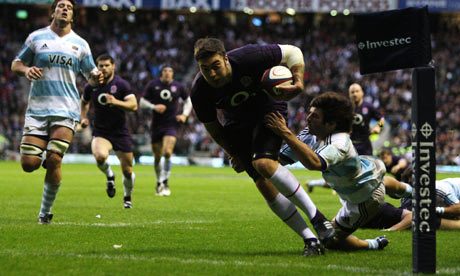
A top International Rugby Board official argued today that the "mentality" of English rugby was more to blame for ruining the sport as a spectacle than the laws of the game or the governing body. Mike Miller, the IRB's chief executive, has urged all concerned "to look at themselves" before complaining about the endless kicking and reduced numbers of tries scored in recent big games.
Following an autumn series in which England registered one try in three games, there have been calls for the IRB to act to resolve the increasing mess at the breakdown. Miller, however, believes the problem is more acute within the English game than elsewhere. "There are certain concerns in certain countries but, if you take a global perspective, you'll find the views coming from England are not necessarily shared around the world," said Miller, speaking at the London launch of next year's Women's Rugby World Cup.
"I think there are more issues in England, based around the style of play and the number of matches. A lot of it comes down to mentality, particularly from the managers and coaches. Regardless of the IRB or the laws, people need to look at themselves and what they're doing. Everyone bears the responsibility of having an attractive game that people want to play and watch."
In common with everyone else, IRB officials followed the three autumn Tests at Twickenham through largely gritted teeth but Miller acknowledged it was "very unlikely" substantive changes to the laws would be rushed in before the 2011 World Cup. "There will be discussions about kicking and around the breakdown but if you talk to six people you get six different solutions.
"Having watched the autumn internationals, the main issue is the kicking. It's the fear factor, particularly the fear of making a mistake in your half. But Australia, New Zealand and Wales still want to play. Rugby is meant to be a flowing game. There are still some countries who can move the ball and score tries and others that can't. You have to ask yourself: is it the game, is it referees, is it the laws or the individual countries themselves?"
The Rugby Football Union, unsurprisingly, begs to differ with Miller, insisting the problem is a shared one. "This is not a peculiar England problem … there are issues all over the place about the number of tries being scored and the number of injuries," said Martyn Thomas, chairman of the RFU's management board. "They're not by any means England specific. Talking to the SANZAR [southern hemisphere unions] countries, they're not scoring tries either. They clearly have an issue with that."
The matter will be aired further at a gathering of Six Nations representatives tomorrow and will also be on the agenda at next week's timely IRB meeting.
Declining crowds are already an issue in Australia and Thomas acknowledges that, at a time of rising injury statistics and steep ticket prices, the sport cannot afford to be complacent. "We've got to look at the game from the spectator's point of view because every country in the world wants more people watching it."
The RFU, meanwhile, has reiterated there will be no knee-jerk reaction to England's mediocre autumn results. Rob Andrew, the director of elite rugby, will present a report to the management board but there is nil chance of Martin Johnson being ousted prior to the Six Nations. "There's no pressure or particular timeline," stressed Thomas, striking a determinedly optimistic note. "I'm looking forward to a really good Six Nations. We came second last year and we want to pip that."
Seated alongside England's women's captain, Catherine Spencer, however, Thomas could not resist an ironic quip – "It's an unusual experience for me to be sitting next to a winning captain" – and would dearly love the men's team, ranked seventh in the world, to be as competitive as their female counterparts.
Next year's women's World Cup will be staged in Guildford, with the semi-finals and final of the 12-team tournament being played at the Twickenham Stoop in early September. Fans who attend will be offered access to priority ticketing information for the men's World Cup in England in 2015. "The tournament will demonstrate how far the sport has come over the last few years," said Miller.
2010 Women's World Cup Pools
Pool A: New Zealand, Wales, Australia, South Africa.
Pool B: England, US, Ireland, Kazakhstan.
Pool C: France, Canada, Scotland, Sweden.
Matches are to be played from 20 August to 5 September. The final is to be held at Twickenham Stoop on Sunday 5 September. Further details can be found at www.rwcwomens.com.

